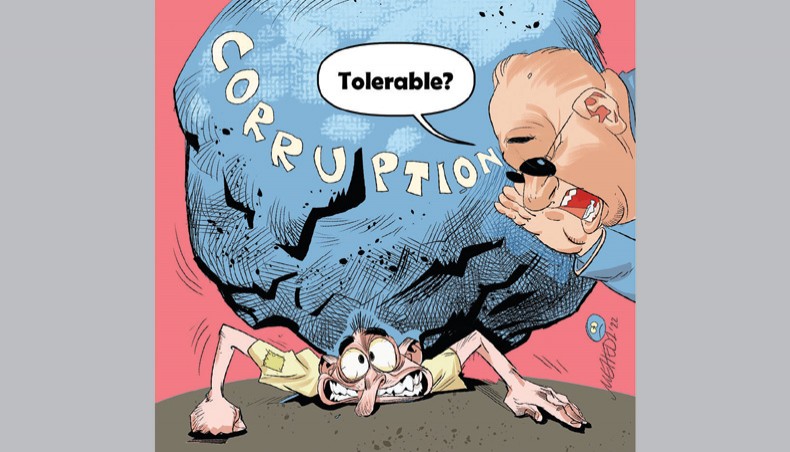
— New Age/Mehedi Haqu
Md Zillur Rahaman : DECEMBER 9 is observed as International Anti-Corruption Day. Development, progress and corruption are very much present in our conversations. By corruption, we mean, in the general sense, the act of violating the rules and regulations of the law. Corruption is a terrible curse in the economic context of a developing country like Bangladesh. It is a kind of crime that is contrary to the laws, and the prevailing customs, values, and norms of society. Corruption tarnishes all achievements of a nation and all the possibilities of national development.
According to the Corruption Perception Index 2022 report released by Transparency International in January 2023, Bangladesh ranks 12th among 180 countries on the list of corrupt countries. The organisation has been showing this picture of corruption in Bangladesh since 2001. Earlier in 2021, the position of Bangladesh was at 13th, and compared to last year, Bangladesh’s position has gone up one notch. TIB said Bangladesh got 25 out of 100, which is 1 point lower than last time and ranks Bangladesh 147th out of 180 countries in order of getting the highest score out of 100 in the list. Bangladesh was in the same position last year as well.
According to TIB, one of the reasons behind corruption in Bangladesh as a whole is the lack of proper implementation of high-level anti-corruption commitments. According to the index, Denmark is the least corrupt country, and then there is New Zealand. The score of the two countries is 88. The two most corrupt African countries are South Sudan and Somalia. The score of the two countries is 12. It should be noted that Bangladesh was at number one on the list of the most corrupt countries in the Corruption Perceptions Index from 2001 to 2005.
In fact, corruption is the biggest enemy of democracy, economic development, and progress in any developing country. The area and scope of corruption in Bangladesh are so vast that it is impossible to explain it in a few lines. In the economic context of a developing country like Bangladesh, bribery and corruption are a terrible curse.
It is needless to mention any particular incident of corruption as there are dozens of recent scams in public procurement, irregularities in relief distribution, loan disbursement and injudicious spending of taxpayer’s money. All such corruption, be it in public procurement or relief and benefits disbursement, deny people their legitimate rights.
The main issues of national development for every nation are investment in human development, good governance in politics, and transparency. For the betterment of national life, every nation has to follow the path of truth and justice. Justice, honesty and transparency lead the nation to the pinnacle of prosperity. In the history of the world, only honest, just and hardworking nations have reached the peak of progress. But when corruption enters national life, the path of all progress in the nation is blocked. Corruption creates national disunity and instability through social inequality, selfishness, mistrust, conspiracy, etc. The development of the nation is possible only if the country and the nation can be saved from the scourge of this deadly social disease.
The precondition for economic growth is freedom from corruption. There is a black chapter of corruption in every sector of present-day Bangladesh and in the lives of every citizen who is under the influence of the black claw of corruption. This catastrophic disease is threatening the country today. Corruption is rampant in all fields, including politics, economy, social policy, industry, trade and business.
The scale, nature, extent, scope and tactics of this corruption are constantly changing. Ordinary people are being crushed under the pressure of bribery and corruption in government institutions. Bribery has been so institutionalised in all public services in the country that there has come to be a common perception that bribery is not illegal but speed money that brings speed to work. According to a 2022 survey report by Transparency International, Bangladesh, almost 71 per cent of houses had to endure corruption while getting services in the 2020–21 financial year, which is 4.3 per cent higher than that of four years ago. In the 2018 survey report, TIB estimated that Tk 106.89 billion was paid in bribes in 2017, which was 3.4 per cent of the national budget that year. The report also revealed that at least 68 per cent of rural and 65 per cent of urban people experienced bribery while seeking legitimate services from law enforcement agencies, road transport authorities, courts, land records and settlement offices, educational institutions, hospitals and 11 other service sectors.
Even though there are laws and legal and constitutional institutions and enough of pledges from political high-ups, corruption continues to pervade and dominate all spectrums of public agencies.
On International Anti-Corruption Day, we can only hope that the paper tigers that our anti-corruption pledges and institutions appear to be would someday begin fighting corruption to ensure people’s rights. But the paper tigers are highly unlikely to come to life as the political, bureaucratic and business elites that rule the country has institutionalised corruption to further their greed and to have a sway over everything, giving rise to an unofficial and unchecked reign of corruption.
What we should not forget is that widespread corruption indicates a distance between the state and society and that corruption is antithetical to economic growth, equality and democracy.
Md Zillur Rahaman is a banker and columnist.
New Age









